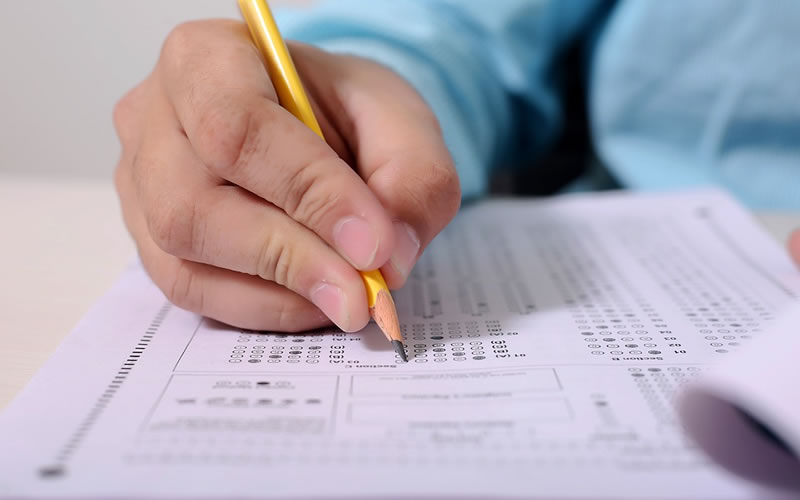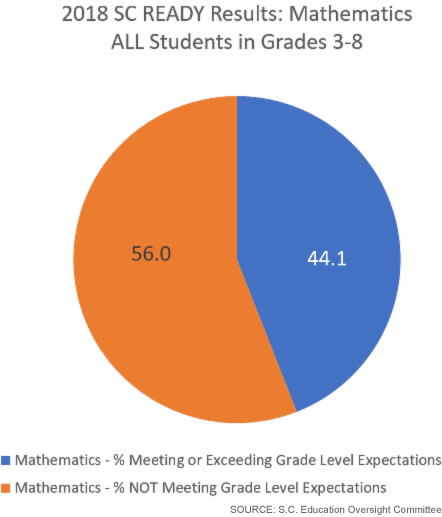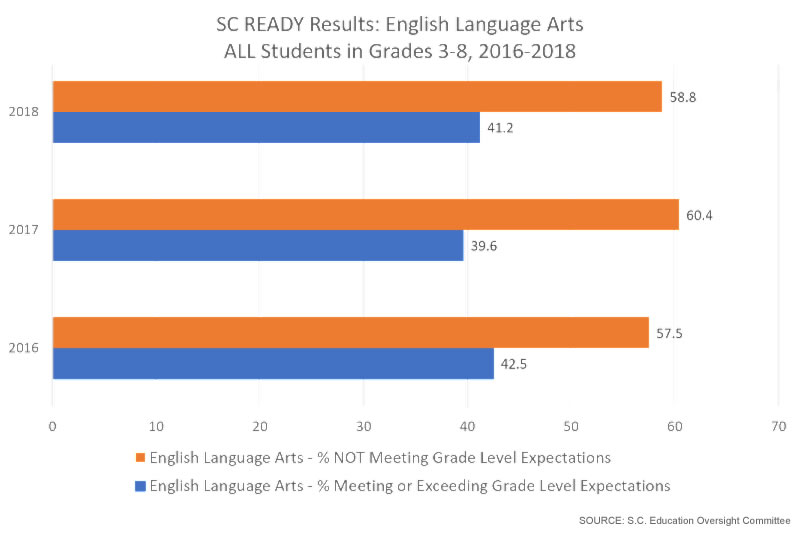
By Lindsay Street, Statehouse correspondent | The annual snapshot of South Carolina’s public school students shows a majority is not meeting grade-level expectations in math or English language arts.
With nearly one in four students struggling in those subject areas, an education policy discussion is boiling in the state.
“It will take support and involvement of parents and community leaders and a culture shift in our state if we are to see progress,” Education Oversight Committee Chairman Neil C. Robinson Jr. said in a statement about the results.
State Superintendent Molly Spearman also released a statement on the need for change: “We are still falling short of the benchmarks set to ensure our young learners are prepared and on track,” she said.

At least one Democratic House member plans to push for better efforts in attracting and retaining quality teachers as well as reducing class sizes — efforts that would cost the state millions.
“We need to reevaluate,” S.C. Rep. Jerry Govan, D-Orangeburg, told Statehouse Report.
Now, however, the renewed policy focus is broader than in the past, attracting bipartisan attention, particularly when it comes to what some lawmakers see as “testing fatigue” and whether the assessments are leading to real improvements in the classroom.
“We’ve overloaded our teachers and districts with testing,” said Sen. Rex Rice, R-Pickens.
The snapshot
One-third of South Carolina’s students in fifth and seventh grade students are not meeting grade expectations in social studies. The trend appears to be worsening over the last few years, according to the report released by the S.C. Department of Education. More than one-third of sixth grade students are not meeting expectations in science.
 Across all grades, more students met or exceeded grade-level expectations in mathematics from 2017 to 2018, with the greatest increase occurring at the fifth grade. Similarly, in English language arts (ELA), at all grade levels except grade 8, there was a greater percentage of students who met or exceeded grade-level expectations.
Across all grades, more students met or exceeded grade-level expectations in mathematics from 2017 to 2018, with the greatest increase occurring at the fifth grade. Similarly, in English language arts (ELA), at all grade levels except grade 8, there was a greater percentage of students who met or exceeded grade-level expectations.
Overall, across all grades, 41 percent of students were prepared or well-prepared for the next grade level in ELA. And 44 percent were prepared or well-prepared for the next grade level in mathematics.
However, that still leaves a majority of students unprepared.
In 2018, 59 percent of students overall needed additional academic support or substantial academic support to be prepared for the next grade level in English language arts. In mathematics, 56 percent of students needed more help to be ready for the next grade level.
Across all grades, about more than a quarter of students were in need of substantial academic support in ELA and mathematics in 2017-2018.

How to move forward
Spearman pledged to work “hand-in-hand” with state teachers to ensure access to tools and resources to help prepare students. Spearman’s office was asked to clarify what concrete steps should be taken to achieve her department’s goals on Monday morning, but, in a response issued more than 24 hours later, spokesman Ryan Brown said the offices were closed due to Hurricane Florence.
[Editor’s note: On Sept. 15, Brown said it was inaccurate for Statehouse Report to say the agency’s lack of a response was due to the office’s closure: “Our lack of response to the subject in question was due to agency preparations and response to Hurricane Florence.” On Sept. 11, however, Brown responded to a Statehouse Report inquiry with this statement: “We are dealing with Hurricane and 430,000 students being out of school and many being evacuated so it will be later this week/next week before I can get you a response. Our offices are closed per Governor executive order.”]
EOC Executive Director Melanie Barton, who was available despite state offices being closed, said the department could figure bigger than the legislature in shoring up education in the state.
“The legislature has a very limited role in actually affecting assessment results at the school level,” Barton told Statehouse Report. “Getting to the detail of what teachers need and the supports that they need, that’s more of a responsibility of the department and school districts working together to find out what they need.”
But state education policy analyst Michelle Exstrom of Denver and others say there are statewide policies that can help.
“Most states are taking a good hard look,” Exstrom said. She is the head of education at the National Conference of State Legislatures, which took up the issue of assessment and accountability in a bootcamp recently. Govan attended the bootcamp. “We have some governance barriers; we have structural barriers.”
Exstrom and others see several critical areas to help improve systems: attracting, preparing and continuing the education of quality teachers; keeping classroom sizes small; keeping high standards; and early interventions.
More quality teachers needed
Like other states, South Carolina’s teacher shortage is working against student success, Exstrom said. Teachers are not graduating at the top of their class, they are not being adequately prepared before entering the classroom, and they are not educated throughout their career.
Exstrom said the best education systems in the world prioritize teacher preparation, pay and continuing education. In South Carolina, Govan, Barton and others also said having more quality teachers will help keep students on grade level.
“We need to have our brightest and our best in the classroom,” Govan said. “We need to dig down beneath the layers and ask the question of why we’re having a shortage of teachers and why we have a loss of interest in the teaching profession and what we can do to address it.”
Barton listed quality teachers as a “big one” impacting student performance.
“That is the number one policy area that needs to be addressed,” she said, adding she predicts the General Assembly will take a hard look at this issue beginning in January.
“Test mania”
Paying for quality teachers could prove to be a big hurdle in the state. But a growing group of bipartisan state senators is trying to tie teacher pay with paring down testing requirements in the state.

South Carolina has upped its game in assessing students, but assessing is not improving, according to Fanning.
“We’re spending tens of millions of dollars on these tests,” said S.C. Sen. Mike Fanning, D-Fairfield, in a telephone interview. “This test mania is not helping us get anywhere. (It’s) additional data upon additional data without accomplishing anything.”
Fanning has filed two bills in two years seeking to cut required testing assessments in the state, believing they are a distraction for teachers and students, and do nothing to prepare students for college or the workforce.
“Tests should not drive curriculum. The teaching and learning should be the importance,” the former high school teacher said.
Though the two previous bills went nowhere, Fanning’s gaining support from some Republicans, like fellow Education Committee member Sen. Rex Rice, R-Pickens.
Fanning said state lawmakers have stopped listening to teachers on the issue, but now many parents are starting to rattle sabers about perceived over-testing and “testing fatigue.” He said “needless” assessments that take a month away from classroom time.
“We can’t let the tail wag the dog. At some point we have to say what are we doing too much of that we could do less of,” Fanning said.
Barton countered Fanning’s argument. Most of South Carolina’s required testing is either federally mandated or comes from the district, school or teacher’s own assessments, she said. The EOC looked at testing in 2015.
“In federal law there are minimum requirements, where we go over is we test in social studies once in elementary and in middle schools,” Barton said. “That is a decision South Carolina has made … (and) we have gotten praise from other entities in our (federal compliance) plan because we do that and have a holistic approach.”
- Have a comment? Send to: feedback@statehousereport.com
















 We Can Do Better, South Carolina!
We Can Do Better, South Carolina!
Lindsay, science, social studies, and math scores are all affected by reading ability. When ELA scores are low, you can expect the other scores to be also.